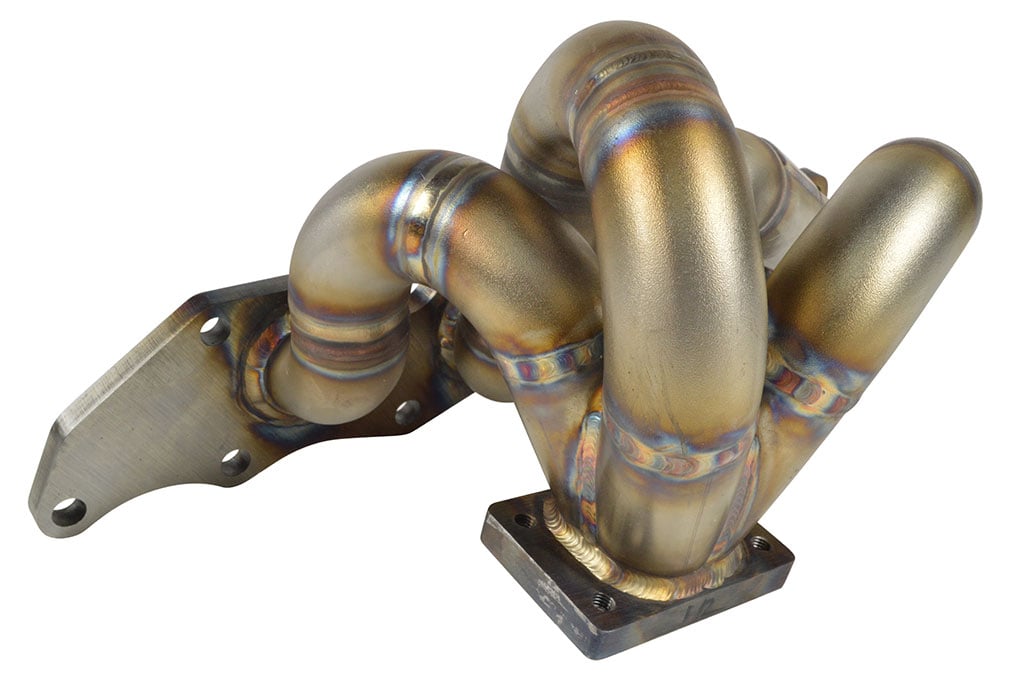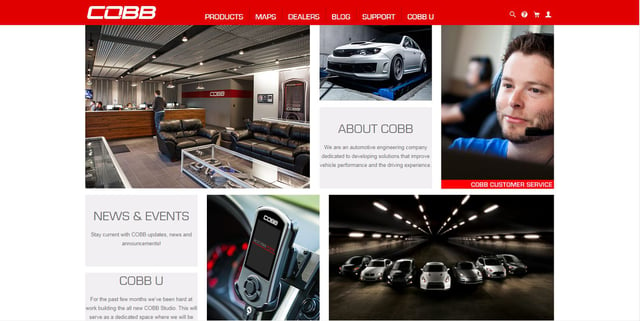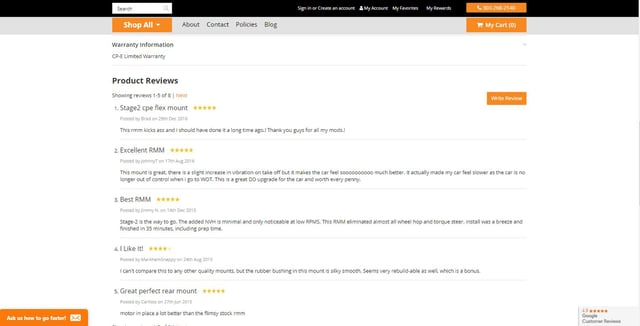
We get it. You just got your paycheck, inheritance, tax return money, yearly bonus or other source of income that can't leave your wallet soon enough so you can go burn more rubber while burning your new greenbacks. Too many times though, the judgement gets cloudy with all these flashy parts. You see what looks like an incredible deal for something and you jump on it to make your money go further. Maybe you can afford another part since you saved so much on the first. You squeeze as much as you can into your digital shopping cart, get free shipping, and wait impatiently for the the big brown truck to show up.
This is a common scenario that lacks an important step in the process of buying parts - considering what you're physically going to get when it arrives. If you're like me, you've experienced a high level of irrational joy and excitement when opening your parts but you've also been super bummed. You thought it was going to be much cooler than what showed up. Or worse, it broke after 6 months or your buddy still puts bus lengths on you.
How do we avoid this unfortunate situation? Research.
Everything you need to know about the part you're going to buy is out there. You just have to look. We're going to share some simple things you can do to make sure you're not going to be disappointed when you break into that cardboard box holding your treasure.
Before you think this might be a sales pitch to buy the most expensive parts, let's get something straight. There are some quality parts out there that are very affordable by any standard. It's good to follow the general rule that you get what you pay for. But I usually reserve that philosophy for the most expensive item and the cheapest item in any given category. A $100 exhaust system on eBay is probably a piece of junk in one way or another. A $1,800 system for the same car is probably going to be the most insanely built, quality exhaust money can buy. In my opinion, everything in between is most likely up for debate. There are pros and cons to almost everything.
1. What company makes the part and what is their reputation?
This is pretty easy research, but necessary. Some name brands you've come to know as household in the performance community are well known partially because of a sweet advertising campaign and/or a cool name and logo. Don't settle for that. Ask yourself, how long have they been around? What is their Google or other similar business rating? What is their reputation inside the communities they serve? Do they have a large amount of complaints on forums from members? If you spend about 10 minutes on your device searching for things like this, you'll probably be surprised what you find people are saying. Look in forums, reddit, automotive blogs, YouTube video reviews (and the comments section with discretion), and other places where parts and companies are reviewed. If all you can find is the company pitching its parts and no 3rd party testers or customers bragging about the part, there might be a reason. One of my favorite companies that shows what they're all about up front is Injector Dynamics. If you want to know what I mean, go to their credibility page on their site. Companies that have things to hide, usually don't have things to show off either.
 |
| You're probably not going to find an About Us page like Cobb Tuning's for a different company that doesn't make pretty solid parts. |
2. Search for reviews.
The internet changed the world in many ways. One thing it did was provide a platform for car enthusiasts to show off their new parts or tell everyone how much they suck when they break. If the part has been out any reasonable amount of time, there are most definitely reviews out there. Make sure you consider the person reviewing it. If they're a 16 year old and it's their first part they've ever bought and they say it sucks because they couldn't figure out how to install it, that's probably not a relevant review source. Actually, if that same person says it's a great part, that might not be reliable either (no offense, 16 year olds). Look for someone that is seasoned with modifying cars. Someone who knows what they're talking about and has a solid automotive background. Not only will they tell you about the part but you might learn something along the way.

3. Are there a bunch of other parts almost exaclty like it?
This one always makes me chuckle when I see someone comparing one part to another, making a decision on which one is better because of the color or what their buddy said on Facebook and I know for a fact they're basically the same thing. If there are a handful of parts out there with super similar features and they're priced similarly, they're probably going to give you very similar results. In that case, and as long as you've done your research about the part and company in general, pick one based on how good the customer service of the company is and how the part fits into your build in terms of styling. There are a handful of parts out there that all do the same thing but have a different color. Just pick your color, so to speak. If the price is significantly different, the fact that they have the same features doesn't tell you they're the same. Do more research about what makes the price different. These companies have people ready to answer the phone or an email (hopefully). Ask them if you want. Or ask us. :)
4. Compare features.
First, if you find an expensive part and the company brags about the features of their part, that's probably something you should see if the comparable part has. If they don't have it, it might not be a deal breaker to you but it could be. It's just good to know what it does or doesn't have. Let's pretend there are two downpipes out there with the only difference being 1/2" thick flanges compared to 3/8" and it's $25 more. You might or might not value the flange now but what if the thinner flange warps and bends after several heat cycles causing a small leak? Would you have paid $25 more if you knew that was going to happen? Probably.
5. Details
At the end of the day, this stuff is NOT all the same. Piping isn't piping like most people that buy on eBay will tell you. I'm not going to go into specific details about every part. If you want to learn more about this stuff...well then keep researching!
Here are some things you can do to dig into the details.
- Who has tested it and what were the results?
- What information can you find from the manufacturer? Can you even find information from the manufacturer? If you can't, then what are they selling besides a picture or a generic description or a price?
- How do the details COMPARE to another part that might cost more or less? Maybe you can find a part with more value, maybe you're looking at the worst one and don't know it.
- What material is it made of? Is that material significantly different than the competitor's? If it is, is it a better material or worse?
- What manufacturing methods do they use? Are they sending everything to China to get the cheapest price possible? Are they a direct copy of another respected company? Do they take pride in making it in America with better materials and craftsmanship? Some overseas manufacturing can be really good, but decide on something that aligns with your idea of how things should be made.
- How much research and development went into the part? Are there dyno graphs, strength tests, performance tests, real world results, etc?
Here are some other things to research when looking for your next performance part that you might not have thought of before.
- Completeness of a kit - there are a lot of parts out there that don't have some of the parts you'll need to complete an installation. Call the seller (us, for example) and ask what else you might need to complete a kit or what supporting modifications you'll need to make it run correctly.
- Maintenance - if you think a catch can continues to catch oil and magically makes it disappear when it's the right time, think again. Make sure you know how to maintain a part or kit if it needs.
- Installation difficulty - don't let a company tell you a part is easy to install. Good companies won't assume you're a mechanic but some companies will mislead you to think anyone can do it. The truth is, if you've never worked on a car or don't have a full set of tools or even just the time to work on your car, you might be left in a bad spot if you can't finish the job. Unless you know someone else will be installing it for you, look up how to install whatever part you want buy before you buy it. You might find it's too in depth for you to handle on your own and there might be a part better suited for your needs.
- Streetability - I think of clutches. Many people buy their first performance clutch thinking it'll handle the power they are putting down and nothing else will change. Little did they know they'd be doing leg day every day on the way to work (with only one leg). Find out the implications of parts. Motor mounts are this way too. Upgrading motor mounts and clutches are great for performance but they're not for everyone, especially those that enjoy all the peace and quiet in the cabin that their car came with.
6. Pricing
Lastly, you should consider the price. Ask yourself these questions about the price. There is no wrong answer. It's purely your choice.

- Is a certain part that has the same exact quality worth the extra cost of the name?
- Is a part that saves you only a few dollars worth it in the long run if it break or fails?
- Is there good value in the part you're considering?
- Are you compromising what you really want for something that you don't want as much just because it costs a little less?
- Is something worth buying just because it's all you can afford right now?
- Can you get a larger number of parts you want instead of going overkill with a smaller amount of costly parts?
We understand budget is important. We all have other things to take care of besides cars. But I can tell you this, if you shop for car parts purely based on price, you're not going to have a great experience. It's going to be harder on you than someone that considers all else.
The best builds require patience and proper execution. What's a good build if you're constantly frustrated with failing parts, colors you don't like, sounds you don't like, a ride you don't feel comfortable with, etc?
Spend some time up front and enjoy every time you get in your ride.
I'm the founder of Edge Autosport and I remember first getting into cars in high school. I read all the magazines, bought a bunch of technical books, and finally got to start wrenching around the age of 19. I really enjoy modding and being able to live out a passion is truly awesome. I wouldn't change a thing.
Topics: